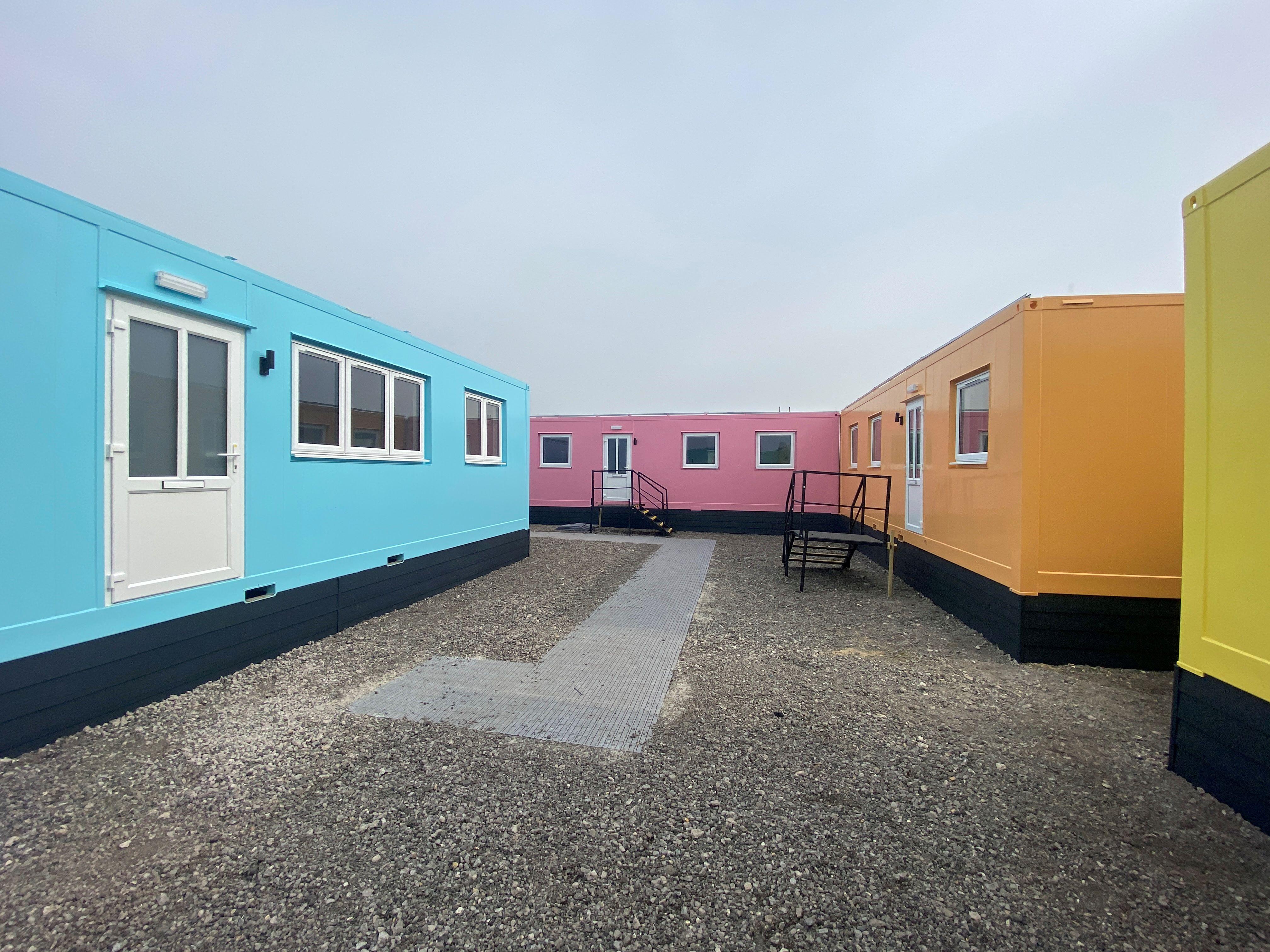Five new multicoloured self-contained modular flats for former rough sleepers have been unveiled, as charity The Bus Shelter Project and Dorset Council prepare to welcome new tenants to start the next step of their journey towards living independently.
The flats have been purchased by the council as ‘moving-on’ units, also known as Phase 2, so people who have already successfully engaged in the Bus Shelter’s support programme can access the service if they need to.
The tenants currently live onsite (in Phase 1), which consists of a bedroom with ensuite facilities. Phase 2 gives tenants an opportunity to manage their everyday life in their own home, including cooking in their own kitchen, paying bills and maintaining the property.
Every flat has been designed to follow the council’s energy efficiency requirements, which include (but not limited to):
- Enhanced insulation, to minimise running costs for heating
- ‘A’ rated windows
- LED lighting
- Solar panels on every unit
- Air source heat pumps
The units were constructed offsite using modern methods of construction by manufacturer, Newspace.
The temporary accommodation units are complementing the existing 12 smaller modular units, also known as ‘pods’, which were placed at the charity’s base on the outskirts of Weymouth in 2021.
Cllr Gill Taylor, portfolio holder for Housing and Health at Dorset Council said:
“This is a project which is changing lives, restoring hope and offering new beginnings to those who have experienced the harsh realities of rough sleeping and homelessness.
“The transition from Phase 1 to Phase 2 is so important, because it’s not just about providing a roof over someone’s head, it’s about empowering people to build the foundation for a better and more fulfilling future.
“This temporary accommodation is part of our wider plan to increase the number of homes for residents, which is helping to combat people living on Dorset’s streets.
“We’re proud to be working with The Bus Shelter and Newspace and pleased we can provide ex-rough sleepers with a modern, environmentally friendly home, in a familiar space where they feel safe.”
Funding for the units has come from the government’s Single Homelessness Accommodation Programme (SHAP), run by the Ministry of Housing, Communities and Local Government (MHCLG) and Dorset Council.
Chief Executive and Co-founder of The Bus Shelter Project, Emily McCarron said:
“As a team, we are incredibly excited for the launch of these five new micro-flats, generously supported by Dorset Council and Homes England.
“As a charity, we believe everyone deserves the dignity of a safe and stable home, and this initiative brings us closer to making that a reality for each of our guests.
“The new flats are more than just a roof over someone's head — they are the next step in their journey here at The Bus Shelter, where consistent support and opportunity is given for rebuilding lives, fostering hope and empowering individuals to embrace a brighter future.
“It has been fantastic to work with Dorset Council and Newspace again on this project and we are super excited to move five of our current guests in and share the next stage of their journey with them!”
The modular units were made entirely in a factory by Gloucester-based company, Newspace. They were delivered to the south coast and craned into place in late February.
Contractors, Qube, prepared the groundwork for the modular units to be installed and have completed the finishing touches, including making steps and installing fixtures and fittings.
The multicoloured flats are 30 square meters, which is bigger than the ‘pods’ onsite. They are made from steel and have solar panels on the roof.
Managing Director of Newspace, Andy Cullimore added:
“We are proud to return for phase two of the project and to continue our partnership with Dorset Council and The Bus Shelter project. The Bus Shelter Project is creating a pathway to independent living and transforming lives. Every town and city should have a scheme like this if we are to end rough sleeping and address the issues of homelessness in the UK”.
“At Newspace, we believe that temporary buildings should be every bit as good, or better, than permanent buildings.
“We design spaces that make people feel their best and have created a safe and comfortable home that not only improves the physical environment, but it works to protect our natural environment, and help drive positive change in part due to our enhanced thermal performance and the addition of solar panels.”
The modular flats took five weeks to build and have an estimated lifespan of 30 years. They can be transferred to another site if required.


Comments
0 Comments